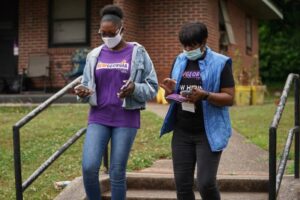
AFP
Atlanta (AFP) – Under slate gray skies in an African American neighborhood in the southwestern outskirts of Atlanta, Mardie Hill knocks on doors, her easy charm an antidote to an unusually frigid late spring afternoon.
The 64-year-old grandmother has been going door-to-door for more than 15 years to encourage residents who may otherwise slip through the net to exercise their hard-won right to vote.
The Deep South state of Georgia is poised to become ground zero for both parties in November’s midterm elections, with broad implications for Joe Biden’s presidency and the US Congress.
But casting ballots has been getting more difficult, says Hill, amid an unprecedented barrage of restrictions that have made the already confusing voting landscape even harder to navigate.
“One year you will have one set of rules, the next year you have lines drawn where it wasn’t drawn before,” she told AFP during a recent “get out the vote” drive for civic engagement group the New Georgia Project in the bungalow-lined streets of East Point.
“And we have to ask our politicians: ‘Why are you doing that?’ We’ve got to hold them accountable. ‘Why do you have to keep changing things?'”
Like Republican-run states across America, Georgia has spent Biden’s term leveraging his defeated opponent Donald Trump’s false claims of a stolen election to introduce restrictive laws that opponents say are an assault on democracy.
After three presidential ballot counts and the collapse of multiple lawsuits brought by Trump’s campaign, no evidence of significant voter fraud ever surfaced in the key battleground.
Nevertheless the Republican-controlled legislature passed the Election Integrity Act of 2021, a law so far out of the mainstream that is now a crime in Georgia to hand out water to voters waiting in line if you are not a poll worker.
The controversial package also contains numerous provisions limiting voting access, including narrowing the window for requesting absentee ballots and tough new ID requirements.
Racial discrimination
Drop boxes have been also been severely curtailed and mobile voting centers are all but outlawed.
Long voting lines and spotty access to government issued ID tend to be a bigger issue in Black areas, leading to complaints of racial discrimination.
Defenders of the tough new rules accuse Democrats of exaggerating fears of voter suppression as a way of juicing fundraising among their base.
They say record early turnout numbers in this year’s primaries — three times higher than in the 2018 midterm cycle — prove that the fuss around the law is bogus.
Voting rights groups and Democrats respond that the big numbers are down to a shift in tactics to mobilize voters under the new rules.
“In fact, what we’re seeing is that Georgians (are) turning out in historic numbers, in spite of their shenanigans and their attempts to make it more difficult to vote,” Nse Ufot, chief executive of the New Georgia Project, told AFP.
“That… is much more a credit to the organizing that is being done.”
The get-out-the-vote efforts of civic engagement groups like the non-partisan NGP helped Biden become the first Democratic presidential candidate to win the state in nearly three decades.
Victory for two Democrats in runoff elections in January 2021 also gave control of the US Senate to Democrats. One of them, Raphael Warnock, is running again in November and defeat could hand the chamber back.
Biden’s victory margin in Georgia was just 11,779 votes out of nearly five million cast, meaning a small chipping away at turnout around the edges is all it would take to reverse the outcome next time.
‘Apple pie and baseball’
“What we like to say here at NGP, is that it’s death by 1,000 cuts,” Jada Richard, 23, who works in communications for the group, told AFP.
“So if they can get just 12,000 people, 5000 people, to stop voting or to feel that it’s too difficult, that’s enough at this point to decide an election.”
Asked to characterize the voting landscape in Georgia, local civil rights leader Jamal Bryant says the state is “somewhere between Jim Crow’s Dixie and South Africa’s apartheid.”
“I think that the ‘1,000 cuts’ is much too passive. I would say it’s not ‘1,000 cuts,’ it’s ‘100 bullets,'” the senior pastor of the New Birth Missionary Baptist Church tells AFP.
Voting rights groups see increasing turnout as their best weapon to ensure that the November’s election can be a fair reflection of the will of every Georgian.
In the case of the New Georgia Project, the goal is to register 55,000 new voters by the end of the year, preferably highly-motivated “super-voters” who will participate in every election.
Meanwhile Bryant’s 9,000 seat megachurch in the city of Stonecrest, in Atlanta’s southeastern suburbs, is working with a network of faith leaders on education, registration and getting out the vote.
“Whether you are wealthy or welfare, you have the same vote and you have the same voice,” Bryant tells AFP at his trophy-lined office behind his arena-sized sanctuary.
“It is — excuse the cliche — as American as apple pie and baseball.”


Recommended Comments
There are no comments to display.